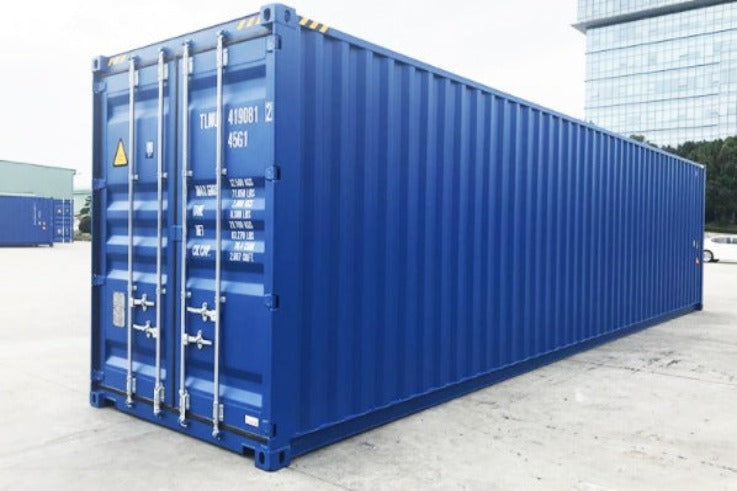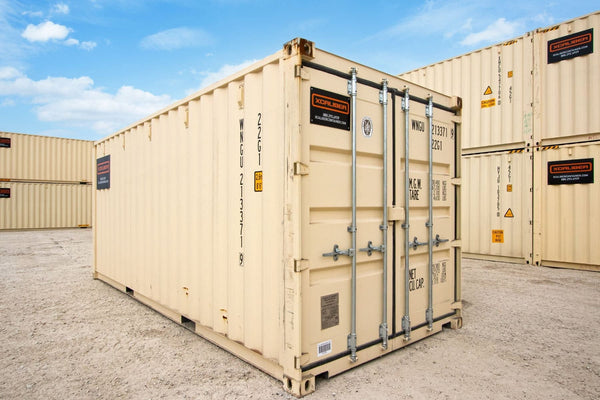How to Rent New Shipping Container 40 x 8 x 9.6 and Turn It Into a Portable Café
How to Rent New Shipping Container 40 x 8 x 9.6 and Turn It Into a Portable Café
Blog Article
The Ultimate Overview to Picking the Right Delivery Container for Your Demands
When it concerns selecting the appropriate shipping container, understanding your certain demands is necessary. You'll wish to take into account aspects like size, type, and product to ensure you make the best selection. From common dimensions to specialized choices, there's a whole lot to explore. Plus, budgeting for both the container and any alterations can make a huge difference. Allow's break down the crucial facets to assist you locate the excellent fit for your demands.
Recognizing Delivery Container Sizes
When you're selecting a delivery container, comprehending the numerous sizes readily available is essential for making the best choice. Shipping containers normally come in conventional sizes of 20 and 40 feet, however you'll also locate various other dimensions. Recognizing the size you need relies on what you intend to shop or transport.If you're moving smaller sized items, a 20-foot container may be excellent, while bigger shipments frequently require a 40-foot container. Bear in mind that the height can also vary; high cube containers use additional upright area, which can be valuable for taller goods - Buy New Shipping Container 40' x 8' x 9’6".Before deciding, measure your freight, and think about exactly how much area you'll need for filling and unloading. Constantly aspect in potential future needs-- deciding for a somewhat bigger container might save you problem down the line. Inevitably, selecting the appropriate dimension will certainly enhance efficiency and assure your things are protected throughout transit
Kinds of Shipping Containers Available
There are numerous kinds of shipping containers readily available, each made for specific purposes and freight demands. The standard dry container is functional, perfect for basic freight. If you're delivering subject to spoiling items, consider a cooled container, which maintains a regulated temperature level. For extra-large things, high cube containers provide additional elevation, accommodating taller loads.If you require to carry hefty machinery or devices, level shelf containers give a strong base without walls. Open-top containers permit for simple loading of tall cargo, with a detachable tarpaulin covering for security. If you're looking for flexibility, think about a collapsible container that can be quickly stored when not in use.Lastly, specialized containers like container containers are used for liquids, while vented containers are created for bulk freight that needs ventilation. Knowing your freight type will aid you select the ideal container to fulfill your delivery needs successfully.
Material Factors To Consider for Longevity
When picking a delivery container, the material plays a vital duty in its durability. You'll intend to consider the advantages of steel versus aluminum, specifically pertaining to rust resistance. Recognizing these elements can aid you make a much more educated selection for your delivery requires.
Steel vs. Aluminum Containers
Just how do you pick in between steel and aluminum containers for your delivery requires? Begin by thinking about toughness. Steel containers are durable and deal excellent strength, making them perfect for hefty lots and extreme conditions. They stand up to damages from effects and are commonly less costly, which can be a significant aspect for budget-conscious buyers.On the various other hand, light weight aluminum containers are lightweight, which can conserve you on delivery expenses. They're less complicated to navigate and are a wonderful choice if you require to transport goods frequently. Nevertheless, light weight aluminum is typically more pricey and less durable than steel. Evaluate your specific demands very carefully, including weight, cost, and the sort of freight you'll be delivery, to make the best choice for your circumstance.
Deterioration Resistance Aspects
Choosing the right material does not just entail weight and expense; corrosion resistance plays a significant duty in toughness. When picking a shipping container, think about the environment it'll encounter. Steel containers, while strong, can rust otherwise properly dealt with. Search for alternatives with protective finishes or galvanization to improve their lifespan. Aluminum, on the other hand, offers natural deterioration resistance, making it ideal for seaside areas or damp problems. It can be much more expensive. In addition, analyze the container's use-- if it'll be exposed to chemicals or severe weather, focus on materials that can hold up against these problems. Purchasing a corrosion-resistant container currently can conserve you from costly repairs or replacements down the line. Select wisely for long-term advantages.
Alterations and Modification Options
Shipping containers aren't simply for transporting products; they can be changed to satisfy your details requirements through various adjustments and customization options. You can convert a standard container right into a comfortable office, a short-term retail shop, and even a personal gym. The opportunities are almost endless.Think regarding including windows, insulation, or air flow to boost comfort. You may additionally think about electrical wiring, plumbing, and even customized shelving to boost functionality. If safety's a concern, enhanced locks can give tranquility of mind.For aesthetic allure, you can paint the container or include an unique design to make it stick out. Don't ignore floor covering choices-- whether you desire long lasting plywood or something a lot more sophisticated, it can raise the space.Ultimately, tailoring your shipping container to fit your needs can enhance use and develop a distinct environment that mirrors your style.
Evaluating Your Transportation Demands
When it comes to using your changed delivery container, recognizing your transport needs is key. Begin by determining what you'll be shipping-- whether it's hefty devices, retail products, or individual products. Each kind of freight has different demands pertaining to size, weight, and accessibility.Next, take into consideration the range and setting of transport. Are you delivering locally, across the country, or internationally? This impacts the container's style and functionality. If you're making use of trucks, guarantee your container fits common measurements for easy loading and unloading.Additionally, assume regarding transit problems. Will your products require unique security from weather or temperature variations? If so, you may need insulation or ventilation functions in your container.Lastly, analyze exactly how usually you'll be delivering products. Frequent deliveries may need a more long lasting and functional container to meet recurring needs. By addressing these variables, you'll be well-prepared to choose the appropriate shipping container for your requirements.
Budgeting for Your Delivery Container
Setting an allocate your delivery container is vital for making certain a smooth investing in process. First, identify just how much you can manage to spend. Maintain in mind that prices can vary significantly based on dimension, problem, and kind. New containers generally cost a lot more, but made use of ones can provide considerable savings.Next, consider any kind of added costs you may incur, such as transport costs, distribution charges, and alterations. If you plan to go right here tailor the container, aspect in those expenditures too. Research study different suppliers to compare rates and find the best deal that meets your needs.Don' t neglect to include any type of permits or laws that might apply to your acquisition and use of the container. By clearly detailing your budget, you'll be much better prepared to make educated choices, guaranteeing you get the ideal container without breaking the bank.
Upkeep and Treatment for Longevity
To ensure your shipping container lasts for many years, routine maintenance is essential. Start by inspecting the exterior for rust, damages, and damage. If you detect any problems, address them promptly to stop more degeneration. Clean the container periodically, both throughout, to eliminate dirt, debris, and moisture that can bring about corrosion.Ensure the doors seal correctly and lube the hinges to avoid rust and sticking. If you're utilizing the container for storage space, consider including go to website ventilation to lower humidity and mold development. For additional security, use a rust-inhibiting paint or sealer annually.If your container's located in a rough environment, like coastal locations, you might need to enhance maintenance regularity. Keep an eye on the floor covering, also; any type of indicators of wear should be repaired right away. With these easy steps, you'll extend the life of your shipping container significantly.
Frequently Asked Concerns
How Do I Discover a Reputable Delivery Container Vendor?
To find a reliable shipping container vendor, beginning by researching on the internet reviews, requesting referrals from pals or industry get in touches with, and comparing prices. Always inspect their credentials and guarantee they use top quality containers that fulfill your demands.

Can I Rental Fee a Shipping Container Rather of Acquiring?
Yes, you can most definitely lease a shipping container instead of getting one. Lots of distributors supply rental alternatives, which can save you cash and give adaptability if you only require it for a short duration.
What Permits Are Needed for Container Placement?

Are Delivery Containers Weatherproof and Appropriate for Outdoor Storage?
Yes, shipping containers are normally weatherproof, designed to withstand severe conditions. Their durable building keeps your products safe and dry, making them suitable for outside storage. you could try here Simply ensure appropriate air flow to avoid moisture accumulation inside.
How Do I Transport a Delivery Container When Bought?

Report this page